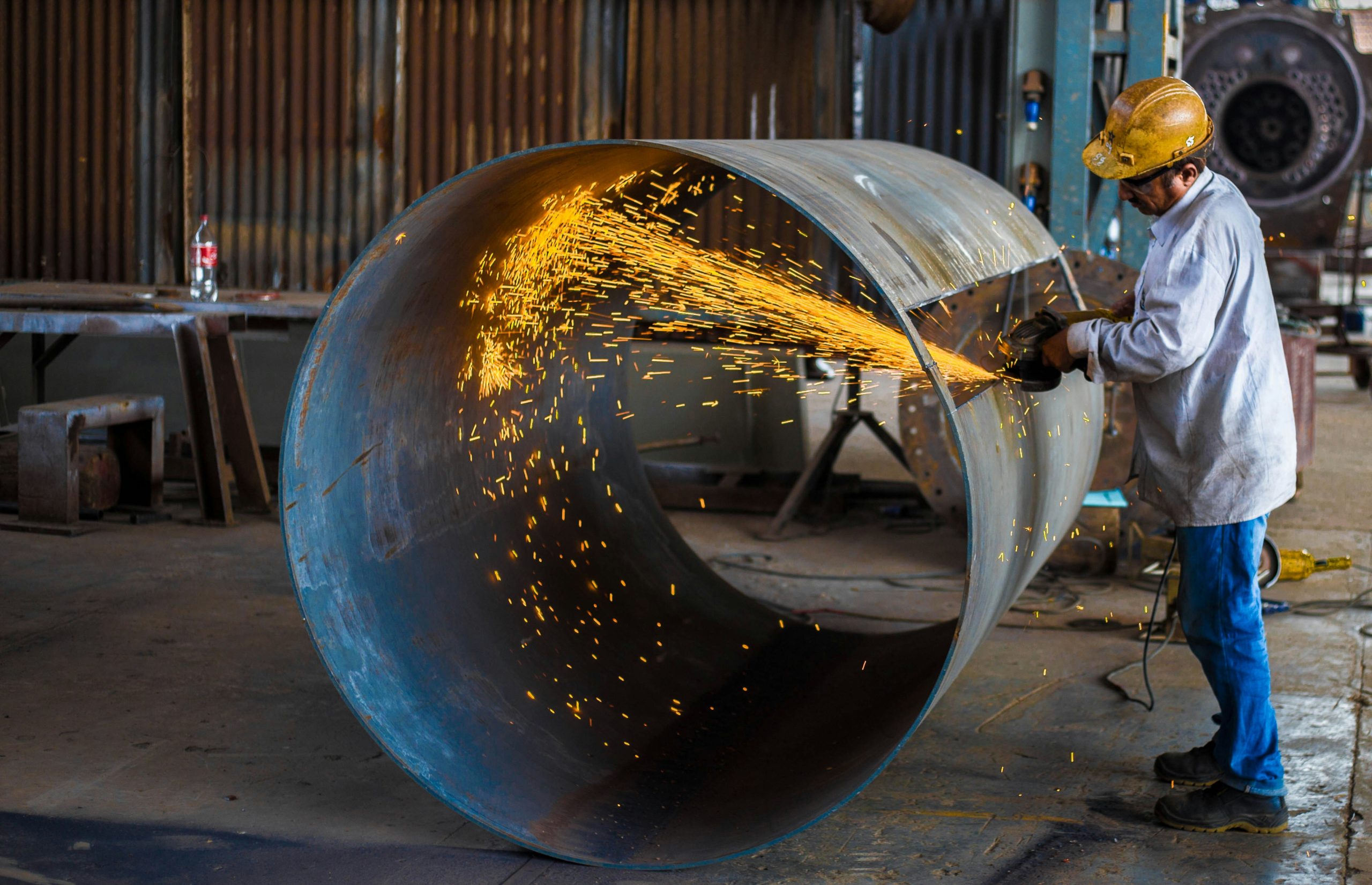In this article, you will gain valuable insights into the importance of heavy-duty die grinder maintenance and how it directly affects overall efficiency. We will explore the significance of regular upkeep in ensuring optimal performance and durability of these powerful tools. By understanding the impact of maintenance on efficiency, you’ll be equipped with the knowledge to improve the longevity and productivity of your heavy-duty die grinder, maximizing its value in various industrial applications.

Importance of Heavy-duty Die Grinder Maintenance
Prolonging Tool Lifespan
Proper and regular maintenance of heavy-duty die grinders is vital to prolonging their lifespan. By taking care of these powerful tools, you can ensure that they continue to perform optimally for a long time. Neglecting maintenance can result in premature wear and tear, leading to the need for expensive repairs or replacements.
Ensuring Optimal Performance
Maintenance plays a crucial role in ensuring the optimal performance of heavy-duty die grinders. Regular inspections, cleaning, and lubrication help to keep the tools in peak condition, allowing them to operate at their full potential. When grinders are well-maintained, they produce smoother, more precise cuts and require less effort from the operator.
Enhancing Operator Safety
Maintaining heavy-duty die grinders is not only essential for the longevity and performance of the tools but also for the safety of the operators. Neglected maintenance can result in safety hazards, such as malfunctioning tools or accidents caused by worn-out parts. By prioritizing maintenance, you create a safer working environment for the operators, reducing the risk of injuries and accidents.
Common Issues Caused by Neglected Maintenance
Decreased Efficiency
One of the most common issues that arise from neglected maintenance is decreased efficiency. When die grinders are not properly maintained, they may struggle to perform tasks efficiently, leading to longer processing times and increased operator fatigue. Regular maintenance helps to keep the tools in top-notch condition, ensuring that they operate at their maximum efficiency.
Increased Downtime
Neglected maintenance can also result in increased downtime. If a heavy-duty die grinder breaks down due to lack of maintenance, it can bring the entire production or project to a halt. Repairs or replacements will be needed, and this downtime can be costly both in terms of lost productivity and additional expenses. Regular maintenance helps to prevent unexpected breakdowns and reduces the risk of unplanned downtime.
Safety Hazards
Perhaps the most concerning consequence of neglected maintenance is the safety hazards it can create. Malfunctioning tools, worn-out parts, or clogged air vents can lead to accidents, putting operators at risk. By addressing maintenance needs promptly and consistently, you can minimize the chances of safety hazards and create a safer working environment for everyone involved.
Regular Inspection and Cleaning
Checking for Wear and Tear
Regular inspection is a crucial part of heavy-duty die grinder maintenance. Inspecting your grinders allows you to identify any signs of wear and tear, such as damaged or worn-out parts. By catching these issues early, you can address them promptly, preventing further damage and ensuring that the grinder continues to function optimally.
Removing Built-up Dust and Debris
Cleaning your die grinders regularly is essential for their proper functioning. During operation, grinders can accumulate dust, debris, and metal particles, which can affect their performance and longevity. By thoroughly cleaning your grinders and removing any build-up, you help maintain their efficiency and prevent potential damage caused by blocked air vents or moving parts.
Lubricating Moving Parts
Lubrication is an essential step in maintaining heavy-duty die grinders. By lubricating the moving parts, such as bearings and gears, you reduce friction and wear. This not only helps to prolong the lifespan of the grinder but also ensures smooth operation and minimizes energy consumption. Proper lubrication also contributes to reducing noise and vibration during operation.
Sharpening and Replacing Grinder Bits
Maintaining Cutting Efficiency
Sharpening or replacing grinder bits is crucial for maintaining cutting efficiency. Over time, grinder bits can become dull or worn out, resulting in decreased cutting performance. By regularly sharpening or replacing these bits, you ensure that the grinder continues to deliver precise and efficient cuts, saving time and effort.
Preventing Overheating
Dull or worn-out grinder bits can cause the grinder to overheat, which can be detrimental to both the tool and the operator. Overheating can lead to premature wearing of parts or even motor burnout. By regularly sharpening or replacing grinder bits, you prevent overheating, enhancing the lifespan of the tool and reducing the risk of accidents or malfunctions.
Reducing Vibration and Noise
Worn-out grinder bits can contribute to increased vibration and noise during operation. Excessive vibration can not only affect the operator’s comfort but also lead to inaccurate cuts. By keeping the grinder bits sharp and in good condition, you can reduce vibration and noise, creating a more comfortable and efficient working environment.

Proper Storage and Handling Practices
Protecting Against Corrosion
Proper storage is crucial for protecting heavy-duty die grinders against corrosion. After use, grinders should be wiped down and stored in a clean and dry environment to prevent moisture from causing rust or other forms of corrosion. Protecting the grinders from corrosion helps to maintain their integrity and ensures their continued performance and longevity.
Preventing Accidental Damage
Proper handling practices are essential to prevent accidental damage to heavy-duty die grinders. Operators should be trained to handle the tools with care, avoiding dropping or mishandling them. Additionally, grinders should be stored in a secure location to minimize the risk of damage from accidental collisions or falls. By implementing proper handling practices, you can help extend the lifespan of the grinders and reduce the need for repairs or replacements.
Using Correct Accessories
Using the correct accessories is crucial for the proper functioning of heavy-duty die grinders. Accessories such as grinder bits or cutting wheels should be compatible with the grinder and appropriate for the intended application. Using incorrect accessories can affect the performance of the grinder and increase the risk of accidents or damage. Proper training and education should be provided to ensure that operators understand the importance of using the correct accessories and adhere to the recommended guidelines.
Training and Education for Operators
Understanding Maintenance Procedures
Providing operators with comprehensive training and education on maintenance procedures is key to ensuring the proper care of heavy-duty die grinders. Operators should be familiar with the manufacturer’s guidelines for maintenance and understand how to perform basic inspections, cleaning, and lubrication. By empowering operators with the knowledge and skills to maintain the grinders, you promote a culture of responsibility and accountability.
Recognizing Early Signs of Malfunction
Operators should also be trained to recognize the early signs of malfunction in heavy-duty die grinders. This includes being able to identify unusual noises, vibrations, or performance issues. By promptly reporting any signs of malfunction, operators contribute to timely maintenance and prevent potential breakdowns or accidents.
Promoting Accountability and Responsibility
Training and education for operators should also emphasize the importance of accountability and responsibility in maintaining heavy-duty die grinders. Operators should understand the impact of neglecting maintenance on their own safety, the performance of the tools, and the overall productivity of the workplace. By fostering a culture of maintenance excellence, operators take ownership of their role in keeping the grinders in optimal condition.

Establishing a Preventive Maintenance Schedule
Creating a Checklist
Establishing a preventive maintenance schedule starts with creating a checklist of maintenance tasks that need to be performed regularly. This checklist should include items such as inspections, cleaning, lubrication, and sharpening or replacing grinder bits. By having a checklist, you ensure that no critical maintenance tasks are overlooked and that the maintenance process remains organized and systematic.
Setting Maintenance Intervals
Determining the frequency of maintenance is essential in establishing a preventive maintenance schedule. This can vary depending on factors such as the intensity of usage, environmental conditions, and manufacturer’s recommendations. Setting appropriate maintenance intervals ensures that heavy-duty die grinders are maintained at regular intervals to prevent issues and maximize their lifespan and performance.
Record-keeping for Accountability
Record-keeping is an integral part of a preventive maintenance schedule. Keeping detailed records of maintenance tasks performed, including dates, inspections, cleaning, and repairs, helps to maintain accountability and ensure that the maintenance schedule is followed consistently. These records also provide valuable information for tracking the performance and lifespan of the grinders, helping to identify any recurring issues or patterns.
Benefits of Implementing Regular Maintenance
Improved Efficiency and Productivity
Implementing regular maintenance for heavy-duty die grinders can result in improved efficiency and productivity. Well-maintained grinders operate at their full capacity, allowing operators to complete tasks more quickly and accurately. This efficiency translates into increased productivity, ultimately benefiting the overall operation and reducing downtime.
Cost Savings on Repairs and Replacements
Regular maintenance can lead to significant cost savings by reducing the need for repairs and replacements. By addressing minor issues through maintenance, you prevent them from escalating into more significant problems that require costly repairs or even the replacement of entire grinders. Investing in regular maintenance is a proactive approach that can save on long-term expenses.
Extended Equipment Lifespan
Proper and regular maintenance can significantly extend the lifespan of heavy-duty die grinders. When grinders are well-maintained, they experience less wear and tear, reducing the likelihood of premature breakdowns or the need for replacements. By maximizing the lifespan of the equipment, you get a better return on your investment and minimize the need for frequent equipment purchases.
Case Studies: Impact of Maintenance on Efficiency
Comparing Performance Between Maintained and Neglected Grinders
Case studies have consistently shown the impact of maintenance on the efficiency of heavy-duty die grinders. When comparing maintained grinders to neglected ones, maintained grinders consistently outperform in terms of cutting speed, precision, and overall productivity. These studies provide concrete evidence of the positive impact regular maintenance has on the efficiency of heavy-duty die grinders.
Quantifying Downtime and Repair Costs
Another aspect highlighted by case studies is the quantification of downtime and repair costs. Neglected grinders experience more frequent breakdowns, leading to unplanned downtime and the need for costly repairs. By implementing a regular maintenance program, companies can reduce downtime significantly and minimize repair costs, resulting in improved operational efficiency and cost savings.
Operator Feedback and Satisfaction
Case studies also involve gathering feedback from operators who work with both well-maintained and neglected grinders. In these studies, operators consistently express higher levels of satisfaction and confidence when using well-maintained grinders. They appreciate the smoother operation, enhanced safety, and reduced fatigue that come from working with properly maintained equipment. Operator feedback supports the importance of regular maintenance in ensuring their satisfaction and productivity.
Tips for Effective Heavy-duty Die Grinder Maintenance
Training and Empowering Maintenance Personnel
Having a well-trained and empowered maintenance team is crucial for effective heavy-duty die grinder maintenance. Maintenance personnel should receive comprehensive training on the specific maintenance needs and procedures for the grinders they will be working with. Empowering them with the necessary tools, resources, and authority ensures that maintenance tasks are completed effectively and on time.
Investing in Quality Grinder Supplies and Accessories
Investing in quality grinder supplies and accessories is a key factor in effective maintenance. Using high-quality replacement parts, lubricants, and cleaning supplies ensures that the grinders are properly maintained and protected. Quality supplies and accessories contribute to the overall performance, efficiency, and lifespan of heavy-duty die grinders.
Creating a Culture of Maintenance Excellence
Creating a culture of maintenance excellence involves fostering a mindset where maintenance is prioritized, valued, and consistently carried out. This can be achieved through regular training and education, promoting proactive maintenance practices, and recognizing the efforts of maintenance personnel. By instilling a culture of maintenance excellence, the value of regular maintenance becomes ingrained in the organization’s operations.
In conclusion, understanding the impact of heavy-duty die grinder maintenance on overall efficiency is crucial for businesses that rely on these powerful tools. By prioritizing regular inspections and cleaning, sharpening or replacing grinder bits when necessary, practicing proper storage and handling, providing training and education to operators, and establishing a preventive maintenance schedule, businesses can experience improved efficiency and productivity, cost savings, and an extended lifespan for their heavy-duty die grinders. The case studies highlighting the impact of maintenance on efficiency, coupled with the tips for effective maintenance, provide valuable insights and guidelines for ensuring the optimal performance and longevity of these essential tools.



